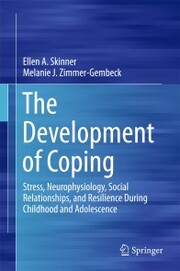<div>This book traces the development of coping from birth to emerging adulthood by building a conceptual and empirical bridge between coping and the development of regulation and resilience. It offers a comprehensive overview of the challenges facing the developmental study of coping, including the history of the concept, critiques of current coping theories and research, and reviews of age differences and changes in coping during childhood and adolescence. It integrates multiple strands of cutting-edge theory and research, including work on the development of stress neurophysiology, attachment, emotion regulation, and executive functions.</div><div><br></div><div>In addition, chapters track how coping develops, starting from birth and following its progress across multiple qualitative shifts during childhood and adolescence. The book identifies factors that shape the development of coping, focusing on the effects of underlying neurobiological changes, social relationships, and stressful experiences. Qualitative shifts are emphasized and explanatory factors highlight multiple entry points for the diagnosis of problems and implementation of remedial and preventive interventions.</div><div><br></div><div>Topics featured in this text include:</div><div><ul><li>Developmental conceptualizations of coping, such as action regulation under stress.<br></li><li>Neurophysiological developments that underlie age-related shifts in coping.<br></li><li>How coping is shaped by early adversity, temperament, and attachment.<br></li><li>How parenting and family factors affect the development of coping. <br></li><li>The role of coping in the development of psychopathology and resilience.</li></ul></div><div><i>The Development of Coping</i> is a must-have resource for researchers, professors, and graduate students as well as clinicians and related professionals in developmental, clinical child, and school psychology, public health, counseling, personality and social psychology, and neurophysiological psychology as well as prevention and intervention science.</div><div><br></div>
Ellen A. Skinner, Ph.D., is a leading expert on the development of childrens motivation, coping, and academic identity in school. She is a Professor in the Psychology Department at Portland State University, in Portland Oregon. As part of Psychologys concentration in Developmental Science and Education, her research explores ways to promote students constructive coping, ongoing classroom engagement (marked by hard work, interest, and enthusiasm), and perseverance in the face of obstacles and setbacks. She is especially focused on two ingredients that shape motivational resilience: (1) close relationships with teachers, parents, and peers, and (2) academic work that is authentic and intrinsically motivating. Melanie J. Zimmer-Gembeck, Ph.D., is a leading expert on social relationships, stress and coping, and autonomy and identity during adolescence. She is a Professor in the School of Applied Psychology and Menzies Health Institute of Queensland, at Griffith University in Queensland, Australia. She also directs The Family Interaction Program, a center that develops, pilots, evaluates and disseminates innovative programs for children, adolescents, and families, focusing especially on building family supports for children aged 1 to 12. Her broad range of research interests and funded projects include parent-infant attachment, stress and other important family issues, adolescent development as associated with couple (dating), peer and family relationships, adolescent sexual behavior and sexuality, the development of emotional, cognitive and behavioral regulation, interpersonal rejection and sensitivity to rejection, and appearance-related concerns.
Section I: Constructing "Developmentally-Friendly" Conceptualizations of Coping.- Chapter 1. Coping as Action Regulation Under Stress.- Chapter 2. Ways and Families of Coping as Adaptive Processes.-Section II: Review of Research on the Development of Stress Reactivity and Ways of Coping.- Chapter 3.Age Differences and Changes in Ways of Coping Across Childhood& Adolescence.- Chapter 4. Neurophysiological Developments that Underlie Age-Related Changes in Coping.-Section III: Normative Development of Coping within the Context of Relationships with Caregivers.- Chapter 5. Development of Coping in Newborns.- Chapter 6. Development of Coping During Infancy.- Chapter 7. Development of Coping During Toddlerhood.- Chapter 8. Development of Coping During Early Childhood.- Chapter 9. Development of Coping During Middle Childhood.- Chapter 10. Development of Coping During Adolescence.-Section IV: Foundations of Coping and its Differential Development.- Chapter 11. Early Adversity, Temperment, Attachment, and the Differential Development of Coping.- Chapter 12. Parenting, Family Stress, Developmental Cascades, and the Differential Development of Coping.- Chapter 13. Conclusion.
„E-Book“ steht für digitales Buch. Um diese Art von Büchern lesen zu können wird entweder eine spezielle Software für Computer, Tablets und Smartphones oder ein E-Book Reader benötigt. Da viele verschiedene Formate (Dateien) für E-Books existieren, gilt es dabei, einiges zu beachten.
Von uns werden digitale Bücher in drei Formaten ausgeliefert. Die Formate sind EPUB mit DRM (Digital Rights Management), EPUB ohne DRM und PDF. Bei den Formaten PDF und EPUB ohne DRM müssen Sie lediglich prüfen, ob Ihr E-Book Reader kompatibel ist. Wenn ein Format mit DRM genutzt wird, besteht zusätzlich die Notwendigkeit, dass Sie einen kostenlosen Adobe® Digital Editions Account besitzen. Wenn Sie ein E-Book, das Adobe® Digital Editions benötigt herunterladen, erhalten Sie eine ASCM-Datei, die zu Digital Editions hinzugefügt und mit Ihrem Account verknüpft werden muss. Einige E-Book Reader (zum Beispiel PocketBook Touch) unterstützen auch das direkte Eingeben der Login-Daten des Adobe Accounts – somit können diese ASCM-Dateien direkt auf das betreffende Gerät kopiert werden.
Da E-Books nur für eine begrenzte Zeit – in der Regel 6 Monate – herunterladbar sind, sollten Sie stets eine Sicherheitskopie auf einem Dauerspeicher (Festplatte, USB-Stick oder CD) vorsehen. Auch ist die Menge der Downloads auf maximal 5 begrenzt.






